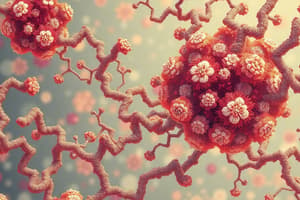Podcast
Questions and Answers
What does the equation B = Q - I represent in amino acid kinetics?
What does the equation B = Q - I represent in amino acid kinetics?
- The rate of dietary amino acid intake
- The net protein balance of the body
- The rate of amino acid release from protein breakdown (correct)
- The rate of amino acid uptake for protein synthesis
During the fed state, what happens to dietary intake of amino acids and glucose?
During the fed state, what happens to dietary intake of amino acids and glucose?
- They are metabolized at a slower rate than in the fasted state.
- They are used to replete lost protein and glycogen. (correct)
- They are exclusively converted to fat for long-term storage.
- They are eliminated from the body through urine.
In the context of disease, what happens to body protein during elevated metabolic rates?
In the context of disease, what happens to body protein during elevated metabolic rates?
- It is stored more effectively for future energy use.
- It is solely used for muscle growth and repair.
- It is mobilized for amino acid oxidation and gluconeogenesis. (correct)
- It remains unchanged despite increased energy needs.
What is the role of glutamine in the body?
What is the role of glutamine in the body?
What percentage of proteins is made up of nitrogen (N)?
What percentage of proteins is made up of nitrogen (N)?
Which of the following amino acids is highlighted for its importance in immunity and healing?
Which of the following amino acids is highlighted for its importance in immunity and healing?
Which phase of digestion occurs first when processing dietary proteins?
Which phase of digestion occurs first when processing dietary proteins?
What activates pepsinogen into pepsin during gastric digestion?
What activates pepsinogen into pepsin during gastric digestion?
How many amino acids are proteins composed of?
How many amino acids are proteins composed of?
Which of the following roles does protein serve in the body?
Which of the following roles does protein serve in the body?
What process occurs at the brush border in protein digestion?
What process occurs at the brush border in protein digestion?
Which enzyme is responsible for cleaving dietary proteins in the stomach?
Which enzyme is responsible for cleaving dietary proteins in the stomach?
What role does stomach acid play in protein digestion?
What role does stomach acid play in protein digestion?
What is the main function of pancreatic proteases in digestion?
What is the main function of pancreatic proteases in digestion?
Which enzyme activates trypsinogen into trypsin?
Which enzyme activates trypsinogen into trypsin?
What is the role of CCK-PZ in digestion?
What is the role of CCK-PZ in digestion?
What are the end products of digestion by brush border endopeptidases?
What are the end products of digestion by brush border endopeptidases?
What is the primary function of enteropeptidase in the digestion process?
What is the primary function of enteropeptidase in the digestion process?
Which structure absorbs amino acids and peptides in the intestine?
Which structure absorbs amino acids and peptides in the intestine?
Which of the following does the brush border use to transport nutrients?
Which of the following does the brush border use to transport nutrients?
Which hormone is responsible for stimulating pancreatic secretion in response to free amino acids?
Which hormone is responsible for stimulating pancreatic secretion in response to free amino acids?
What role does trypsin play in the digestive process?
What role does trypsin play in the digestive process?
What activated form of the enzyme is chymotrypsinogen converted into?
What activated form of the enzyme is chymotrypsinogen converted into?
What role does HCO3- play in digestion?
What role does HCO3- play in digestion?
Which substance is secreted by pancreatic acinar cells to neutralize stomach acid in the duodenum?
Which substance is secreted by pancreatic acinar cells to neutralize stomach acid in the duodenum?
What is the end result of the hydrolysis process initiated by pancreatic proteases?
What is the end result of the hydrolysis process initiated by pancreatic proteases?
What type of transport is facilitated by the Na+,K+-ATPase enzyme?
What type of transport is facilitated by the Na+,K+-ATPase enzyme?
How is trypsinogen activated to trypsin?
How is trypsinogen activated to trypsin?
What are dipeptidases and tripeptidases responsible for in the intestine?
What are dipeptidases and tripeptidases responsible for in the intestine?
Which of the following statements is true regarding CCK-PZ?
Which of the following statements is true regarding CCK-PZ?
What initiates the secretion of CCK-PZ in the duodenum?
What initiates the secretion of CCK-PZ in the duodenum?
Which of the following is NOT a function of pancreatic proteases?
Which of the following is NOT a function of pancreatic proteases?
Where is the primary site for the action of pancreatic proteases?
Where is the primary site for the action of pancreatic proteases?
What is the primary mechanism for the absorption of amino acids from the intestinal lumen?
What is the primary mechanism for the absorption of amino acids from the intestinal lumen?
What do amino acids, dipeptides, and tripeptides need for absorption at the brush border?
What do amino acids, dipeptides, and tripeptides need for absorption at the brush border?
Which of the following statements about protein turnover is true?
Which of the following statements about protein turnover is true?
Which method uses isotopically labeled tracers to measure amino acid kinetics?
Which method uses isotopically labeled tracers to measure amino acid kinetics?
What does steady-state tracer concentration relate to in amino acid kinetics?
What does steady-state tracer concentration relate to in amino acid kinetics?
What element plays a crucial role in the Na+-dependent co-transport of amino acids?
What element plays a crucial role in the Na+-dependent co-transport of amino acids?
In non-growing healthy adults with stable weight, protein turnover is characterized by what balance?
In non-growing healthy adults with stable weight, protein turnover is characterized by what balance?
Which of the following is NOT a characteristic of tracer methods in amino acid kinetics?
Which of the following is NOT a characteristic of tracer methods in amino acid kinetics?
What is the role of the Na+,K+-ATPase in amino acid absorption?
What is the role of the Na+,K+-ATPase in amino acid absorption?
Glutamate is synthesized from which of the following compounds?
Glutamate is synthesized from which of the following compounds?
Flashcards are hidden until you start studying
Study Notes
Protein Function
- Proteins are essential for bodily function.
- They provide structural support, assist with biochemical reactions, and regulate signaling.
- Examples include muscles, enzymes, hormones, and cytokines.
Protein Structure
- Proteins are composed of 20 unique amino acids.
- 16% of the weight is nitrogen.
Dietary Protein
- Digestion and Absorption
- Phase 1: Gastric Digestion
- Chief cells in the stomach secrete pepsinogen, which is activated by gastric acid (HCl) to pepsin.
- Pepsin breaks down proteins into large peptide fragments and free amino acids.
- Phase 2: Digestion by Pancreatic Proteases
- The duodenum releases cholecystokinin (CCK-PZ) and secretin.
- This stimulates the release of pancreatic enzymes: trypsinogen, chymotrypsinogen, proelastase, and procarboxypeptidases.
- Trypsinogen is autocatalytically activated to trypsin.
- Trypsin activates other pancreatic enzymes, breaking down protein into smaller peptides and free amino acids.
- Phase 3: Digestion at the Brush Border
- Enzymes on the brush border of the intestinal lining (e.g., enteropeptidase) further break down peptides into dipeptides, tripeptides, and free amino acids.
- Phase 4: Absorption
- Amino acids, dipeptides, and tripeptides are absorbed into the intestinal epithelial cells through Na+-dependent co-transport.
- Dipeptides and tripeptides are further hydrolyzed into amino acids.
- Phase 5: Transport
- Amino acids are transported into the bloodstream via facilitated diffusion.
- Phase 1: Gastric Digestion
Amino Acid Metabolism
- Pathways of Amino Acid Synthesis and Degradation:
- Aminotransferases play a key role in amino acid metabolism.
- Transamination : transferring an amino group from one amino acid to an alpha-keto acid, yielding a different amino acid and alpha-keto acid.
- Deamination :removal of the amino group from an amino acid, producing ammonia and an alpha-keto acid.
- The carbon skeletons of amino acids enter the citric acid cycle or are used for gluconeogenesis.
Protein Turnover
- Proteins are constantly being broken down (catabolism) and synthesized (anabolism) - this is called protein turnover.
- This balance determines the net protein synthesis or breakdown.
- Factors influencing turnover:
- Type of protein (e.g., structural proteins have slower turnover rates than regulatory proteins).
- Physiological state (e.g., anabolic states increase protein synthesis).
Measuring Protein Turnover
- Traditional methods include nitrogen (N) balance studies, which measure the intake and excretion of nitrogen.
- Tracer methods - Use isotopically labeled tracers (e.g., 13C, 2H) to track the metabolism of specific amino acids.
- Allow researchers to measure protein synthesis and breakdown more directly.
Amino Acid Requirements
- Essential amino acids cannot be synthesized by the body; they must be obtained through diet.
- Nonessential amino acids can be synthesized by the body.
- Amino acid needs depend on age, health status, and dietary intake.
- Classical N balance studies can determine amino acid requirements, however, tracer methods are becoming more common.
Protein in Disease
- Disease states (trauma, infection, surgery, etc.) can lead to increased protein breakdown and loss.
- This can make certain amino acids become conditionally essential.
- Supplementation with essential amino acids (e.g., glutamine, arginine) may be necessary to support healing and maintain nitrogen balance.
Protein Controversies
- High Protein Intake and Renal Failure
- High protein intake is often recommended in weight loss programs, but concerns exist regarding its effects on kidney function.
- Studies have shown conflicting results - some demonstrating no harm, others suggesting potential negative impact, especially for individuals with pre-existing kidney disease.
- Protein Intake and Bone Health
- High protein intake is often associated with increased calcium excretion, potentially impacting bone health.
- However, well-balanced diets include sufficient calcium and other nutrients.
- Adequate calcium intake is crucial regardless of protein levels.
Dietary Recommendations
- The CDC recommends daily protein intake based on age, sex, and activity level.
- See the CDC website for details: https://www.cdc.gov/nchs/data/hus/2020-2021/mcrnutr.pdf
Studying That Suits You
Use AI to generate personalized quizzes and flashcards to suit your learning preferences.



